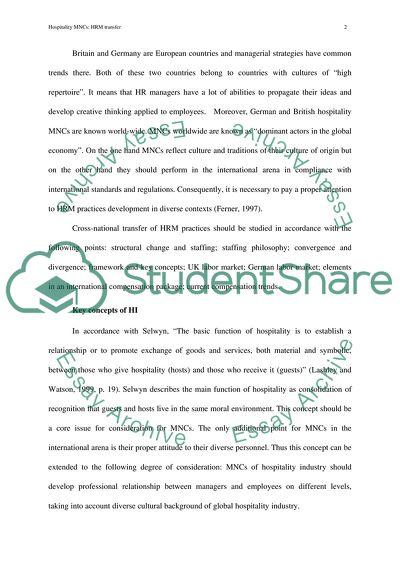Cite this document
(Hospitality MNCs - HRM Transfer Assignment Example | Topics and Well Written Essays - 3000 words, n.d.)
Hospitality MNCs - HRM Transfer Assignment Example | Topics and Well Written Essays - 3000 words. Retrieved from https://studentshare.org/human-resources/1744307-discuss-the-issues-and-challenges-facing-hospitality-mncs-in-attempting-to-transfer-their-hrm-practices-across-national-boundaries
Hospitality MNCs - HRM Transfer Assignment Example | Topics and Well Written Essays - 3000 words. Retrieved from https://studentshare.org/human-resources/1744307-discuss-the-issues-and-challenges-facing-hospitality-mncs-in-attempting-to-transfer-their-hrm-practices-across-national-boundaries
(Hospitality MNCs - HRM Transfer Assignment Example | Topics and Well Written Essays - 3000 Words)
Hospitality MNCs - HRM Transfer Assignment Example | Topics and Well Written Essays - 3000 Words. https://studentshare.org/human-resources/1744307-discuss-the-issues-and-challenges-facing-hospitality-mncs-in-attempting-to-transfer-their-hrm-practices-across-national-boundaries.
Hospitality MNCs - HRM Transfer Assignment Example | Topics and Well Written Essays - 3000 Words. https://studentshare.org/human-resources/1744307-discuss-the-issues-and-challenges-facing-hospitality-mncs-in-attempting-to-transfer-their-hrm-practices-across-national-boundaries.
“Hospitality MNCs - HRM Transfer Assignment Example | Topics and Well Written Essays - 3000 Words”, n.d. https://studentshare.org/human-resources/1744307-discuss-the-issues-and-challenges-facing-hospitality-mncs-in-attempting-to-transfer-their-hrm-practices-across-national-boundaries.


